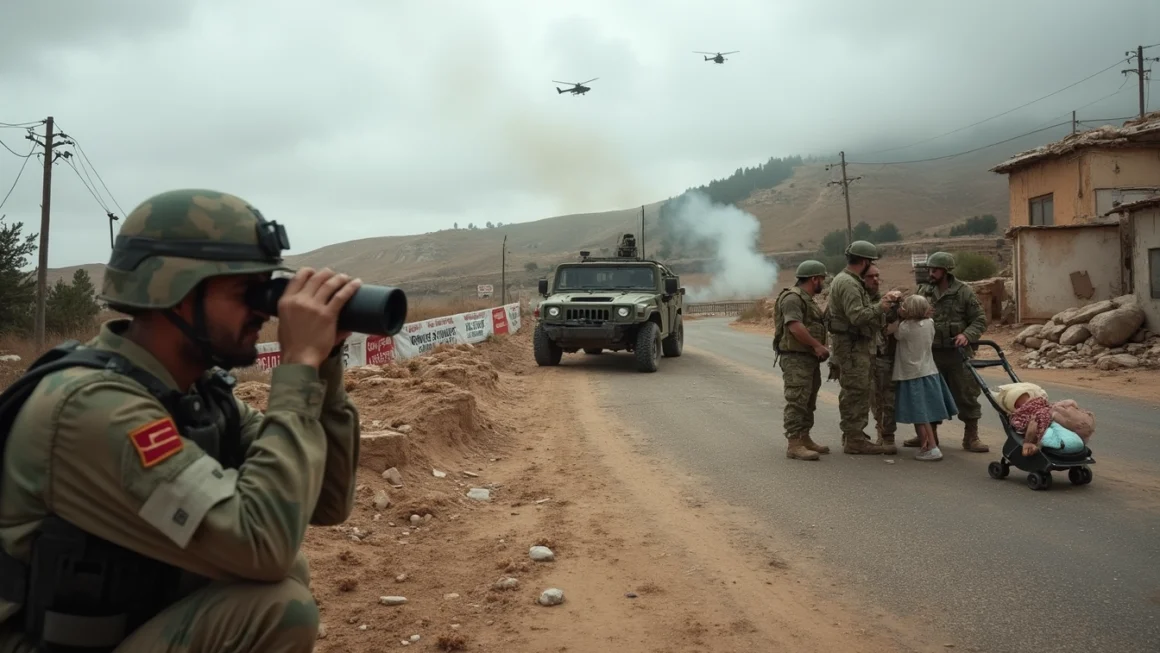Escalating Tensions on the Lebanon-Israel Border
Table of Contents
The ongoing conflict between Israel and Hezbollah has seen a significant escalation, with recent incidents causing concern for civilians in border areas. On November 21, 2023, a series of exchanges took place, highlighting the fragile nature of the situation.
Key Incidents on November 21
Several notable events occurred during this period of heightened tension:
- The Israel Defense Forces (IDF) reported multiple launches from Lebanon towards Israel.
- In response, the IDF struck various Hezbollah targets in Lebanon.
- A civilian in Metula, Israel, was injured by anti-tank missile fire.
- Hezbollah claimed responsibility for attacks on Israeli military sites.
Civilian Impact and Displacement
The escalating conflict has had a significant impact on civilian populations in both countries:
- In Lebanon, over 55,000 people have been displaced from southern areas.
- Israeli communities near the border have faced evacuations and disruptions.
- Civilian infrastructure, including homes and vehicles, has been damaged in cross-border fire.
The humanitarian situation remains a critical concern, with displaced populations requiring ongoing support and assistance.
International Response and Humanitarian Aid
The international community has been closely monitoring the situation, with various organizations providing humanitarian support:
- UN agencies and NGOs are working to assist displaced populations in Lebanon.
- Emergency response teams are on standby to address immediate needs.
- Calls for de-escalation have been made by multiple international bodies.
Humanitarian organizations are facing challenges in delivering aid due to the volatile security situation. Efficient coordination and automation of aid distribution could potentially improve response times and effectiveness in such crisis situations.
Broader Regional Implications
The conflict between Israel and Hezbollah is not occurring in isolation. It has broader implications for regional stability:
- Concerns about a wider regional conflict involving multiple states.
- Potential impact on neighboring countries, particularly Syria.
- Economic consequences for Lebanon, already facing a severe economic crisis.
The situation remains fluid, with the potential for rapid changes that could affect the entire region.
Historical Context of the Conflict
To understand the current situation, it’s important to consider the historical context:
- Long-standing tensions between Israel and Hezbollah dating back decades.
- Previous conflicts, including the 2006 Lebanon War.
- Ongoing disputes over border demarcation and territorial claims.
This historical backdrop provides insight into the deep-rooted nature of the conflict and the challenges in finding a lasting resolution.
Diplomatic Efforts and Peace Initiatives
Despite the escalation, there are ongoing diplomatic efforts to ease tensions:
- UN peacekeeping forces continue to operate in the region.
- International mediators are working to facilitate dialogue between parties.
- Calls for a ceasefire and return to negotiations from global leaders.
The success of these diplomatic initiatives remains uncertain, but they represent crucial efforts to prevent further escalation.
Impact on Lebanese Economy and Infrastructure
The conflict is exacerbating Lebanon’s already fragile economic situation:
- Disruption to trade and commerce in border regions.
- Strain on public resources due to displacement and infrastructure damage.
- Potential long-term economic consequences for affected areas.
The economic impact adds another layer of complexity to the humanitarian challenges faced by Lebanon.
Role of International Law and UN Resolutions
The conflict raises important questions about international law and existing UN resolutions:
- Relevance of UN Security Council Resolution 1701 (2006).
- Compliance with international humanitarian law by all parties.
- Potential for new resolutions or international interventions.
These legal frameworks play a crucial role in shaping international responses and potential paths to resolution.
Looking Ahead: Scenarios and Implications
As the situation continues to evolve, several potential scenarios emerge:
- Further escalation leading to a broader conflict.
- Successful de-escalation through diplomatic channels.
- Prolonged low-intensity conflict with sporadic flare-ups.
Each scenario carries significant implications for regional stability, civilian populations, and international relations.
Conclusion: A Call for Peaceful Resolution
The escalating hostilities between Israel and Hezbollah present a complex and dangerous situation with far-reaching consequences. The immediate priority remains the protection of civilian lives and the provision of humanitarian aid to those affected. As the international community continues to monitor and respond to the crisis, there is an urgent need for all parties to engage in dialogue and seek a peaceful resolution to prevent further loss of life and instability in the region.
The situation underscores the importance of robust diplomatic efforts, adherence to international law, and innovative approaches to conflict resolution and humanitarian assistance. As events continue to unfold, the global community must remain vigilant and proactive in its pursuit of peace and stability in this volatile region.




